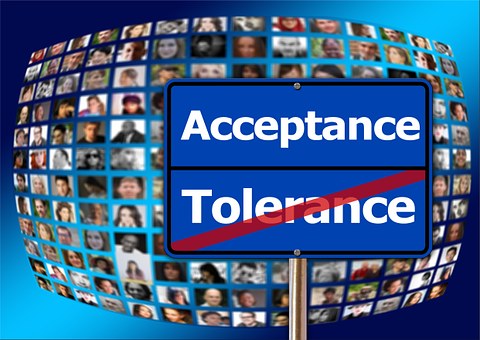In recent weeks we as Americans have been challenged with the realization that we have not progressed as much as we thought in race relations and gender equity. We’ve been confronted with everything from a letter positing that women are genetically inferior by a former Google engineer to the President of the United States tacitly endorsing white supremacy and Nazi sympathizers.
Tolerance Vs Acceptance
Often discussions around race and gender tend to use Tolerance and Acceptanceinterchangeably. However, in order to have a constructive discussion, it is important to realize that there is a world of a difference between the two.
Tolerance can be defined as the ability or willingness to tolerate something, in particular, the existence of opinions or behaviors that one does not necessarily agree with.
Whereas, acceptance can be defined as the action or process of being received as adequate or suitable, typically to be admitted into a group.
Let’s take the example of a workplace scenario. If your workplace is merely tolerant of you and not really accepting of you, that translates to you being surrounded by colleagues that see you but don’t embrace you. They smile at you but they don’t make you a part of their lives. As workplace psychologist Jennifer Newman says,
“Embracing diversity in the workplace requires understanding, not just tolerance”
Acceptance is the aim or aspiration we should be working toward every day. Acceptance is born from our collective of empathy, understanding, and maturity.
Tolerance is easy
Tolerance is a very low bar. If we truly desire to be better leaders and people, we must do the hard work for acceptance.
Tolerance is a start. Tolerance is easy.
Just about a year ago, the AT&T CEO made a profound statement and I am here to repeat it today – Tolerance is for cowards.
Turning Tolerance into Acceptance
First and foremost, it starts with being honest with oneself. We need to uncover our true feelings before we can even begin to accept each other. We need to start by openly admitting to ourselves and others how we really feel. Only when we get to the root of our true feelings, will we be able to get to the level of acceptance. But if we don’t communicate with one another, Tolerance eventually makes way for hatred. Because while acceptance is unconditional, Tolerance is conditional.
Building a company or a society that is accepting, that is inclusive, requires open and honest conversations. That’s when we become aware of another person’s perspective. But having honest conversations can sometimes be uncomfortable. So as leaders, the question we need to ask ourselves is, how committed are we to have the conversation, keep the conversation going, even when it gets uncomfortable?
Do you have open and honest conversations with your team/company about race relations and gender equity? Please share your experiences in the comments below.
Originally published at www.vantagepointcoach.com


